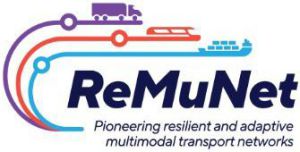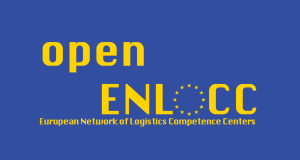what is ADMIRAL about?
Project Overview
ADMIRAL is an EU-funded project aiming to transform supply chain management in freight transportation by developing a cutting-edge digital marketplace for multimodal logistics. This solution will allow companies to manage the entire supply chain, including related emissions. For 3 years, 20 partners from 9 EU countries are working jointly to develop the knowledge, business models and technology needed to build and implement the platform. The ADMIRAL marketplace will be demonstrated and piloted in four regions: Portugal-Spain, Slovenia-Croatia, Lithuania, and Finland.
Through these efforts, the ADMIRAL project seeks to shift the focus on indirect emissions, reduce overall emissions in logistics and transportation and enhance transparency throughout the supply chain.
Challenges
Why are logistics services key to emission reduction?
Logistics and transportation are among the significant contributors to GHG emissions in Europe. This share will likely increase in the near future, given rising cargo volumes and more closely connected supply chains. However, companies have mostly taken measures to reduce their direct emissions and emissions arising from their energy consumption. In contrast, indirect transport and logistics services emissions have been largely overlooked. Reasons for the negligence of these emissions are primarily cost calculations as the driving factor, the absence of a need to report on them, and the difficulty for companies to calculate the impact of one selection of service providers compared to another on overall emissions in the supply chain.
This trend will change with upcoming EU regulation in 2023, requiring larger companies to report on the emissions resulting from their value chain, which are not directly caused by the company itself (Scope 3 emissions). The new regulation motivates companies to shift their focus towards reducing emissions in logistics and transport services and gaining a better overview and management of all emissions throughout the supply chain.


Objectives
What drives ADMIRAL activities?
The ADMIRAL project aims at:
- shifting the focus of the logistics and transport industry towards prioritising emission reductions by providing tools for companies to respond to regulatory and consumer demands
- developing the ADMIRAL marketplace, which will provide information on multimodal logistics and transport processes and allow companies to optimise logistics networks, visualise emissions along the whole supply chain, and thus select the most environmentally friendly combination of service providers
- achieving a 20% emissions reduction in transportation and logistics by offering process optimisation and emission monitoring along the whole supply chain
- enhancing cooperation, visibility and resilience between supply chain actors by connecting supply and demand through the ADMIRAL marketplace
- contributing to the global competition on business-to-business logistics platforms
- developing business models for multimodal low-emission transport chains
SOLUTIONS
HOW TO REDUCE EMISSIONS & OPTIMISE PROCESSES?
ADMIRAL will develop a digital marketplace incorporating the whole supply chain to connect logistics service providers and buyers, thereby simplifying cooperation. The marketplace will offer services, digital and and cover sea, port and hinterland operations. It will allow buyers, e.g. cargo owners, to select a provider based on information such as delivery times, associated emission levels and service costs. This will enable companies to optimise transport and logistics processes, including emissions throughout the supply chain, even across different countries, and also adds to the resilience of supply chains as one user or application can be easily replaced in case of a disruption.
In addition, the ADMIRAL marketplace will also function as an innovation platform for developers of digital solutions to distribute their services and products and create awareness of sustainable solutions in transport and logistics.

Pilots and Methodology
How will solutions be developed & tested?
The ADMIRAL marketplace will be developed in collaboration with the ADMIRAL pilots representing port operators, postal logistics, and road transport services, each having different requirements.
Starting from a marketplace with ‘generic’ functionalities, each pilot will contribute one or more advanced services or solutions to the marketplace. Therefore, First-hand user experience guides the first applications embedded within the marketplace, which will primarily use AI technologies.
The marketplace will be piloted in four European regions, thus testing and further refining solutions implemented to:
- optimise current logistics infrastructure and cargo fleets
- pave the transition to greener transport modes and providers
- allow for the selection of low-emission services through the multimodal low-emission marketplace
A DIGITAL, GREENER AND MORE ENERGY-EFFICIENT MULTIMODAL PORT CORRIDOR BETWEEN SINES & MADRID
The Port of Sines is a deep-water port located 150 km south of Lisbon and is Portugal’s primary energy supply port. It is connected to the main hinterland by road and rail and is positioned at the crossroads of two major deep-sea shipping routes, the North-South, and the East-West. The port serves a hinterland covering the Portuguese territory and a considerable part of Spain.
Who is involved
- Pilot Partner / Ports of Sines and the Algarve Authority
- Scientific Support / LNEC & UPM
- Data integration and support / MARLO
- Multimodal logistics service providers / Medway (Rail Operator), dry ports Torrejon and Azuqueca de Henares, Abronigal, and Coslada
- Local authorities
Activities
- create catalogue of low emission transport services on corridor level and inclusion of strategies and services into marketplace
- integrate marketplace of low emission freight with existing platforms and initiatives for logistics operations (JUL platform, NEXUS initiative) to develop a marketplace for applications and APIs for the entire port and logistics community
- Freight mobility data from the Port of Sines and its hinterland is used as data basis
Expected Outcomes & Impact
- mutimodal and green digital corridor between Sines & Madrid promoting horizontal and vertical network collaboration of the logistics community
- more digital, synchronized, collaborative processes in multimodal transport through information exchange
- more efficient use of existing assets and networks resulting in time and cost savings, reduced administrative efforts and significant CO2 reductions
INTEGRATION OF ISOLATED POSTAL LOGISTICS NETWORKS ACROSS COUNTRY BORDERS THROUGH DIGITAL TOOLS
About
Postal logistics traffic between Slovenia and Croatia is characterised by large parcel volumes. However, postal operations pass through two exchange offices located in Ljubljana and Zagreb and largely depend on road transportation and pre-defined routes and schedules. Between the two countries, postal traffic from Slovenia is clearly larger than Croatia’s, mostly arriving from the North-East and predominantly destined for Zagreb.
Logistics networks so far operate separately, resulting in delayed information on, e.g. the number, weight and dimensions of shipments which makes it difficult to plan ahead and thus optimise warehouse processes. Another challenge are last-mile deliveries in Croatia which are currently are handled through a collaborative crowd-shipping platform which is not integrated with the Post of Slovenia.
Who is involved
- Pilot Partners / Post of Slovenia and Post of Croatia
- Scientfic Support / University of Ljubljana
- Logistics Planning Tool / Solvesall
Activities
- develop cross-border logistics/transport planning tool linking logistics network members
- integrate logistics planning tool into separate business networks thus establishing marketplace dynamics and offering easier access to outside players
- include transparency and sustainability rating of services portfolio
- Shipment Data, as well as data on demand and supply of cargo space and transportation is used as data basis
Expected Outcomes and Impact
- coordinated cross-border logistics framework through digital tools and services
- information on all demand and supply dynamics, shipment qualities and quantities and logistics resources via logistics planning tool
- optimized route planning, cargo occupancy and harmonization of demand
- informed procurement of (sustainable) logistics services by end users
- open market possibilities for transport services provision and network connectivity including external stakeholders
- reduced CO2 emissions per package distribution by 25%
- reduced transport costs from Slovenia to Croatia by 30
DIGITISING COOPERATION BETWEEN MEMBERS OF LOGISTICS NETWORKS IN ROAD TRANSPORTATION
About
Transport, especially Road Transport Services, plays a significant role for the Lithuanian economy. With increasing attention to sustainable transport, services need to be adapted. The highest potential for achieving a green transition has been identified at a network level, specifically in the exchange of data through integrated digital tools across organisations.
Data collection and digital tools have been used for internal organisational purposes. Between organisations, data is exchanged via individual communication tools, which do not allow for real-time information exchange. The pilot therefore focuses on building digital links between logistics network members, namely a large freight company (CargoGO) and a transport hub (KLEZ) representing 46 companies.
Who is involved
- Pilot Partner / Transport Innovation Association
- Logistics Partners / KlaipedaFEZ and CargoGo
- Digital Tools and Integration / Trevio and CSign
- Network Connectivity / NORMALisTech
Activities
- develop digital tools for resource and fleet management compatible with existing digital solutions and establish data exchange between members of logistics networks
- Impact assessment of developed solutions through industry use cases
- CO2 footprint calculation with allocation between logistics stakeholders and integration with digital tools
- Freight mobility data from digital tools and platforms used by logistics partners is used as data basis
Expected Outcomes and Impact
- real-time operational data sharing and freight shipment process optimisation
- enhanced use of human resources and freight transport resources
- reduced CO2 emissions by min. 20% at network level
EFFICIENT PORT OPERATIONS THROUGH INCREASED DATA SHARING, DIGITALISATION AND AI-BASED PLANNING
About
The Port of HaminaKotka consists of several terminals, including Hietanen RoRo Terminal, the main pilot location, operated by Steveco Oy. This terminal handles about 2.4M tons/year; 80% of this volume is covered by exported forest products such as paper, pulp and sawn timber. Products meant for export are mostly transported to the port warehouses by rail, but a considerable cargo amount also arrives by truck. Overall, the terminal has approx. 130,000 m2 warehouses and 67,700 m2 of storage space. The terminal uses a tailored IT system (FLOW) integrated with customer IT systems.
The main customers of the Hietanen Roro terminal have their own logistical solutions and combining the objectives of all partners – customers, trucking companies and port as well as railway operators, will increase the overall efficiency of the logistical system.
Steveco has adopted the Truck Appointment System (TAS) through previous projects, providing better knowledge on incoming truck schedules and the PORTMOD simulation tool, which offers improved planning of required asset capacity.
Who is involved
- Pilot Partner / Steveco Oy
- Scientific Support / VTT
Activities
- Develop and test an AI-based tool providing handling plans on schedules and cargo volumes from incoming shipments arriving by truck and train
- Offer unloading plans for incoming shipments allowing for coordinated use of warehouses, equipment & workers for separate cargo flows of forest industry companies (both small and large)
- Assignment of shipments to optimal warehouse storage location and/or direct further transport
- Expansion of PORTMOD tool from TRL5 to TRL 7 with AI-based tool
Expected Impacts
- Reduced unloading time of trucks and trains at the port by 15%
- Reduced emissions of working machines by approx. 15 % as a result of higher productivity
- Increased warehouse passage by 15% more cargo
- Advanced handling of cargo by workers and port equipment by 20%




